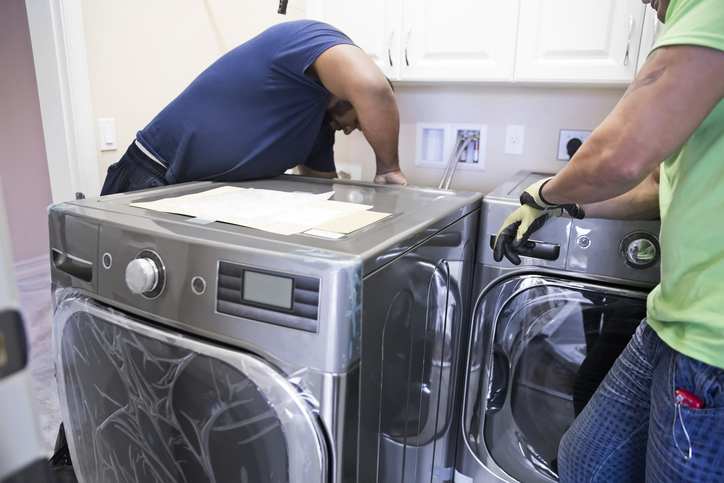Does a Clothes Washing Machine Have to be GFCI or AFCI Protected?

By: Jerry Durham | Nov 12, 2018
Does a Clothes Washing Machine Have to be GFCI or AFCI Protected?
Answer: Yes, it does (in a dwelling), but interestingly enough- not because the NEC says that it does- specifically.
First: Always, refer to the manufacturer’s installation instructions. If the installation instructions require something above and beyond the currently adopted electrical Code, the inspector will require that of you, if he/she is aware of the manufacturer’s requirement. If those instructions require less than the minimum adopted electrical Code, (as those instructions pertain to the electrical portion of the installation), then you will be required to go beyond those instructions provided by the manufacturer to comply with the minimum adopted electrical Code for your jurisdiction.
GFCI Protection:
Now, let’s refer to NEC 2017, Section 210.8 for the answer to the GFCI portion of our question:
210.8(A)(10) – All 125V, 15a and 20a receptacles installed in “Laundry Areas” shall have GFCI protection.
The NEC doesn’t require GFCI protection for clothes washing machines specifically, but it does for “Laundry Areas.”
Now, here is the question: Are you, as an installer, putting this washing machine in the laundry area?
If the answer is “yes”, then you have your answer- the clothes washing machine will be GFCI protected, because all 120-Volt receptacles are to be GFCI protected in laundry areas, per the 2017 NEC.
If the answer is “no”, then we are faced with another question: Does the placement of a clothes washing machine into ANY area of the home make it a laundry area? I will say this: it takes a 120-Volt outlet, a drain system, and a water supply to use a clothes washing machine, so YES! It is this inspector’s opinion that wherever you install a clothes washer, you have established a “laundry area”.
Possible Exception: Existing work will be different than new work that is performed under the 2017 NEC. If you install a washer in a room (any room) and use an existing receptacle in that room that is not GFCI protected, and the house was built during a Code cycle that did not require GFCI protection for receptacles in that room, then you may be in the clear as far as the electrical portion of the installation. UNLESS, your local inspector states you have just created a new “laundry area” by placing a washer in that room. We could all agree that placement of a clothes washer in an area that was not equipped for a clothes washer would require new plumbing to serve that washer. So, the inspector would have plenty of traction for that “new laundry area” argument.
Likely Exception: Placing a new clothes washing machine into an existing laundry area that did not require GFCI protection when the home was built, if no other alterations to the laundry area are made, would likely not trigger anyone’s radar regarding GFCI protection. The replacement of a clothes washing machine in this scenario requires no electrical permit in any jurisdiction that I am aware of, and therefore requires only that you follow manufacturer’s instructions.
(Note: All of this information applies to a “dwelling.” In a location other than a dwelling, the NEC does not require GFCI protection for the installation of a clothes washing machine. The inspector will enforce the manufacturer’s instructions regarding GFCI protection when it comes to non-dwelling installations.)
AFCI Protection:
Refer to 210.12(A) of the 2017 NEC, which states: All Dwelling-Unit 120 Volt 15a and 20a branch-circuits supplying outlets or devices in …”laundry areas” shall be AFCI protected.
Therefore, by default, the clothes washing machine in a dwelling unit laundry area will be AFCI protected. Nearly every room/ area in a dwelling unit requires AFCI protection, so no matter where you put a clothes washer, it will be AFCI protected in a newer home.
If you install a washer in any room of an older home, and that home was built prior to the electrical Code cycle that required AFCI protection for that area, you might be OK. BUT, if you need to plumb the drain and water supply lines to that clothes washer, the inspector may again say that you have just “built” a new laundry area and may then hold you to the AFCI requirements found in the 2017 NEC.
As always, refer to the manufacturer’s installation instructions regarding AFCI requirements for the installation of your new clothes washing machine. Explore our electrical license continuing education courses today.


Is a GFCI receptacle behind the washing machine considered accessible? Is it required ti be?
All GFCI devices, including those of the receptacle and circuit-breaker type(s), have to be Readily Accessible – as defined in Article 100 of the 2017 NEC. Always verify the NEC Code-cycle in force at the time of the installation, before coming to a conclusion as to whether this receptacle or any other electrical installation is compliant.
The definition we find in Article 100 for Readily Accessible makes it clear that we must not be required to climb over or under, or otherwise move anything to reach that which is considered- Readily Accessible.
So, does the GFCI receptacle behind the clothes washing machine have to be Readily Accessible? Yes!
Is the receptacle considered Readily Accessible when installed in that location? Not if I must climb over or under…or move anything to reach it.
Your electrical inspector has the final say in this, but I can tell you from experience that this location is typically not approved as Readily Accessible.
The exception would be when the GFCI receptacle is installed high enough on the wall behind the washing machine so as I can reach out and touch the wall (GFCI device) without any accommodation.
But clothes washers generally stick off the wall due to plumbing behind the machine, and they are deep appliances to begin with. So making contact with the wall behind the machine may be difficult for some.
And, folk typically want these receptacles hidden down low behind the machine and not in plain sight.
With these things in mind, you can see the difficulty one may confront when trying to get an electrical inspector to declare this receptacle as Readily Accessible.
Thank you for your question!
-Jerry Durham, Instructor
Good article!
Is a gfci outlet needed if the washer has a dedicated circuit and is on a single outlet?(not a duplex)
Yes and it has been for may code cycles. This receptacle must be dedicated to laundry use so just as easy (or easier) to put a dual function receptacle receptacle located in the laundry area as it is to put in a single receptacle and a dual function breaker at the panel.
The washer that was brought from another country was 240 VAC. Therefore no GFCI required per manufactures instructions. Different language per paper work. This per say was Residential unit. Now what do you do? This same requirement was done by our company at the NEC 1993 interpretation. NEC 90.4 said use single outlet per manufactures instructions. Label 240 VAC. NEC requirements at receptacle and electrical panel. Color code white to red at both ends. Good luck with this one.
Why does my washer keep tripping the AFCI/GFCI outlet? What can be done to resolve this issue?
Does a 220 volt 30 amp dryer require a AFCI breaker?
2017 NEC only requires 125V circuits be GFCI and AFCI protected. The 2022 NEC changes that to 250V. So, if your local jurisdiction has adopted the 2022 at the time of your permit submission, than yes it is required. If not, than no it is not required.
In either case, the 125V circuits would need be protected.
Here is 2017 NEC section:
210.8 Ground-Fault Circuit-Interrupter Protection for Personnel (A) Dwelling Units: All 125-volt, single-phase, 15- and 20- ampere receptacles installed in the locations specified in 210.8(A (1) through (10) shall have ground-fault circuit-interrupter protection for personnel…
Is there any code reference that dictates the height of a readily accessible GFCI outlet in a laundry area? I have a building inspector telling me that my receptacle outlet that is 44 inches off the ground is not readily accessible when my washer and dryer are 40 inches tall. He says that if someone later down the line decides to put in a platform, then it will become inaccessible. I don’t think we can justify holding someone to a theoretical, what if. Does the code say anything about this? I know we could do GFCI breakers but those are expensive, and $60 on 165 townhomes is a bigger deal.
I’ve got a combination mud/mechanical/laundry room setup. I will have a Polaris gas water heater that requires 110 for the power vent and low voltage for controls, a circulating pump for the hydronic heat, low voltage fan for fresh air draw. There is also going to be a freezer in this area. If the room is required to be all GFIC, than would I be better off putting the washer and dryer in a small closet like area with bifold doors?
re: would I be better off putting the washer and dryer in a small closet like area with bifold doors?
why go through the trouble??? installing a GFIC outlet involves the same labor as installing a regular outlet, and the increased expense is neglible